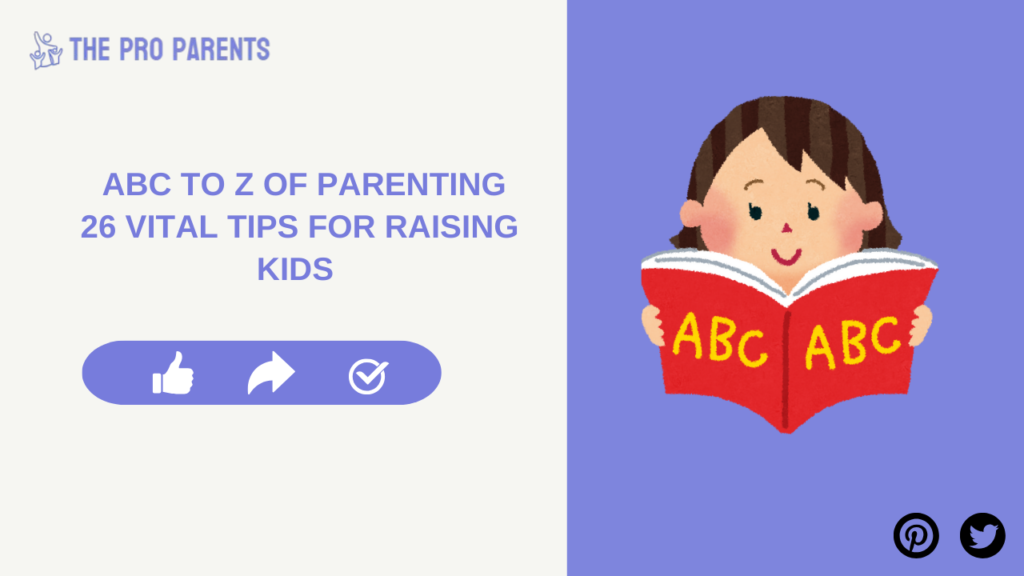Parenting is one of the most fulfilling yet challenging roles you’ll take on. It requires endless love, patience, and adaptability. Every choice you make shapes your child’s future, but with so many responsibilities pulling you in different directions, where do you even begin? The ABCs of Parenting provide a simple yet powerful framework to guide you through every step of your parenting journey.
Table of Contents
This comprehensive guide breaks down 26 essential principles—each represented by a letter of the alphabet—to help you focus on what truly matters. Whether you’re a new parent, an experienced caregiver, or an early childhood educator, these ABCs of Parenting will help bring clarity and intentionality to your parenting style.
Who Invented ABC to Z Parenting?

The concept of ABC to Z Parenting was pioneered by a group of child psychologists and educators who believed in a holistic approach to raising children. Their vision was to simplify parenting by covering every critical aspect of a child’s emotional, physical, and cognitive development—right from infancy to adolescence.
This method emphasizes practical strategies that address the challenges parents face at every stage, offering clear, step-by-step guidance to foster a nurturing and balanced home environment.
Why Every Parent Needs to Understand This Method

Parenting is one of the most rewarding yet demanding journeys. The ABC to Z Parenting approach equips parents with the knowledge and tools to:
- Build Stronger Connections: Learn how to communicate effectively with your child.
- Encourage Healthy Growth: Support their emotional and physical well-being at every age.
- Handle Challenges Confidently: Navigate difficult situations with ease, from tantrums to teenage independence.
Every parent deserves to feel confident and empowered, and ABC to Z Parenting provides the roadmap to achieve just that.
A – Active Involvement in Your Child’s Life
Parenting begins with being actively involved in your child’s life. This means more than just meeting basic needs; it’s about engaging with them in everyday activities, nurturing their interests, and ensuring they feel supported.
Key Actions:
- Attend parent-teacher meetings and extracurricular activities.
- Play games, explore hobbies, and spend time together.
- Show interest in their school and social lives.
- Share family activities like meals, walks, and reading.
- Recognize their individual efforts and milestones.
B – Balance Between Discipline and Compassion
While discipline is necessary for setting boundaries, compassion helps nurture emotional intelligence and understanding.
Key Actions:
- Explain the reasons behind rules to foster understanding.
- Respond with empathy to mistakes rather than anger.
- Provide consistency but with a soft, compassionate approach.
- Praise positive behavior and teach consequences for missteps.
- Recognize emotional triggers that affect behavior.
C – Consistency
Children thrive in environments where expectations are clear and consistent. When you stick to routines, rules, and boundaries, children feel safe and secure.
Key Actions:
- Create predictable routines for daily activities.
- Stick to rules even on weekends and holidays.
- Be consistent in applying discipline and consequences.
- Use family calendars to keep track of important events.
- Reinforce routines for meals, homework, and bedtime.
D – Developmental Milestones
Every child grows at their own pace, but understanding developmental milestones can help you monitor your child’s progress.
Key Actions:
- Track physical, cognitive, and emotional milestones.
- Encourage development through activities like reading, puzzles, and outdoor play.
- Consult with pediatricians if milestones are delayed.
- Celebrate achievements, from crawling to solving problems.
- Use milestone checklists to monitor your child’s growth.
E – Empathy
Empathy teaches children to understand and share the feelings of others. It helps them build meaningful relationships and regulate their emotions.
Key Actions:
- Teach empathy by modeling compassionate behavior.
- Acknowledge your child’s feelings and validate them.
- Practice active listening when your child speaks.
- Discuss emotions and how to express them constructively.
- Encourage your child to consider the feelings of others.
F – Flexibility
Parenting requires flexibility to adapt to your child’s changing needs and different circumstances. There’s no one-size-fits-all approach.
Key Actions:
- Be willing to reassess parenting strategies as your child grows.
- Adjust your discipline and routines to fit your child’s personality.
- Seek advice when something isn’t working, and stay open to change.
- Allow space for your child’s individuality to develop.
- Encourage open discussions about changes in routine or expectations.
G – Gratitude
Teaching gratitude helps children focus on the positive aspects of their lives and appreciate what they have.
Key Actions:
- Encourage a daily gratitude practice, like sharing three things they’re thankful for.
- Model gratitude in your own life.
- Praise your child for expressing thanks and appreciation.
- Help your child focus on the positive, even in challenging situations.
- Show gratitude towards your child for their contributions and efforts.
H – Healthy Boundaries
Setting clear and healthy boundaries helps children understand expectations and fosters respect for others and their environment.
Key Actions:
- Establish boundaries around screen time, chores, and family time.
- Model respect by setting boundaries for yourself as well.
- Be firm but compassionate when enforcing boundaries.
- Help your child understand the “why” behind each boundary.
- Review and adjust boundaries as your child matures.
I – Independence
Encouraging independence fosters confidence, self-reliance, and resilience in children. It helps them make decisions and handle challenges on their own.
Key Actions:
- Allow your child to make age-appropriate decisions.
- Encourage problem-solving and decision-making skills.
- Celebrate achievements, no matter how small.
- Assign tasks or chores that foster independence.
- Let your child take responsibility for their actions.
J – Joy
The joy in parenting is in the little moments of shared laughter and happiness. Fostering joy strengthens the parent-child bond.
Key Actions:
- Embrace playfulness and spontaneous moments.
- Share activities that bring both of you joy, such as dancing or art.
- Laugh together during fun family activities.
- Make time for relaxation and joy-filled routines.
- Celebrate holidays and traditions that create lasting memories.
K – Kindness
Modeling kindness teaches children how to treat others with compassion and respect.
Key Actions:
- Praise acts of kindness and generosity.
- Teach your child to recognize and appreciate kindness in others.
- Show kindness through everyday actions, like sharing or helping.
- Encourage your child to help with community service.
- Make kindness a core family value.
L – Listening
Listening is essential to healthy communication. It creates trust and makes your child feel valued.
Key Actions:
- Practice active listening and avoid interrupting.
- Show empathy by reflecting their feelings.
- Encourage your child to share their thoughts without judgment.
- Listen attentively, even in challenging moments.
- Make time for conversations, especially when your child is upset.
M – Mindfulness
Mindfulness practices can help manage stress and increase emotional awareness, which is essential for both parents and children.
Key Actions:
- Teach your child simple breathing exercises.
- Practice mindfulness activities like mindful walks or meditations.
- Encourage your child to be present during activities.
- Use mindfulness techniques to stay calm during difficult moments.
- Model mindfulness by staying calm and focused.
N – Nurturing
Nurturing supports a child’s emotional growth and helps them feel valued and cared for.
Key Actions:
- Be emotionally available when your child needs to talk.
- Offer praise and validation for their efforts.
- Create a safe, comforting environment for your child to express emotions.
- Provide consistent affection and love.
- Support your child’s dreams and aspirations.
O – Organization
A well-organized environment can reduce stress and help your child learn responsibility and time management.
Key Actions:
- Create clear schedules for daily activities and schoolwork.
- Use calendars or planners to keep track of important events.
- Set up systems for chores, school projects, and personal tasks.
- Teach your child how to organize their workspace and belongings.
- Encourage family organization through regular cleaning or decluttering.
P – Positive Reinforcement
Positive reinforcement encourages good behavior by rewarding it with praise or tangible rewards.
Key Actions:
- Recognize and praise efforts and good behavior.
- Use positive reinforcement to motivate your child.
- Focus on progress rather than perfection.
- Offer rewards that match the behavior being encouraged.
- Reinforce positive actions consistently.
Q – Quality Time
It’s not about how much time you spend with your child, but how intentional it is. Focus on spending quality time without distractions.
Key Actions:
- Designate “no phone” times to give your full attention.
- Plan fun, interactive activities like games, crafts, or outings.
- Establish traditions like weekly family dinners or movie nights.
- Prioritize one-on-one time to strengthen your bond.
- Make moments with your child memorable by staying engaged.
R – Respect
Respect is the foundation of a healthy relationship between parents and children. Model respectful behavior in your everyday actions.
Key Actions:
- Listen to your child’s opinions and validate their feelings.
- Treat your child with the same respect you expect in return.
- Set clear expectations for respectful behavior and enforce them consistently.
- Recognize and encourage acts of respect towards others.
- Use positive language to foster a culture of respect in the home.
S – Self-care
Taking care of your own mental, emotional, and physical health is vital for being the best parent you can be. You can’t pour from an empty cup.
Key Actions:
- Schedule “me time” for activities like yoga, reading, or meditation.
- Get adequate sleep and maintain a balanced diet.
- Pursue hobbies that bring you joy and relaxation.
- Seek emotional support from friends, family, or professionals when needed.
- Model self-care to show your child the importance of health and well-being.
T – Teaching Responsibility
Teaching responsibility helps children become accountable and develop important life skills.
Key Actions:
- Assign age-appropriate chores and tasks.
- Use tools like charts or calendars to track responsibilities.
- Encourage ownership of actions and decisions.
- Teach your child to care for their belongings and environment.
- Discuss the consequences of actions and how to learn from mistakes.
U – Understanding
Understanding your child’s emotions and actions helps you respond more empathetically and build emotional intelligence.
Key Actions:
- Pay attention to emotional cues and body language.
- Ask open-ended questions to understand their feelings.
- Validate your child’s emotions, whether positive or negative.
- Avoid jumping to conclusions or making assumptions.
- Encourage open dialogue and express your willingness to listen.
V – Values
Instilling core family values helps children develop a moral compass that guides them throughout their life.
Key Actions:
- Share stories from your life to illustrate important values like honesty, integrity, and kindness.
- Reinforce values through daily actions and decisions.
- Encourage your child to make decisions based on family values.
- Practice gratitude, humility, and perseverance in your own life.
- Celebrate when your child demonstrates core values, like helping others.
W – Well-being
Supporting your child’s overall well-being includes their physical, mental, and emotional health.
Key Actions:
- Encourage a balanced diet with nutritious foods and regular exercise.
- Discuss mental health openly to reduce stigma and promote well-being.
- Ensure your child has enough sleep for optimal growth and development.
- Foster a positive environment where your child feels safe and loved.
- Provide opportunities for relaxation and downtime to avoid burnout.
X – eXploration
Encouraging exploration allows your child to discover new interests, ideas, and environments, fostering curiosity and creativity.
Key Actions:
- Support your child’s interests by providing materials and experiences to explore them.
- Take regular trips to museums, parks, and nature trails to spark curiosity.
- Encourage creative activities like drawing, music, or imaginative play.
- Allow time for unstructured play to promote creativity and problem-solving.
- Challenge your child to explore new subjects and hobbies.
Y – Your Role as a Parent
As a parent, you are your child’s first teacher, role model, and greatest advocate. Your influence shapes their view of the world.
Key Actions:
- Lead by example in areas like kindness, responsibility, and perseverance.
- Create an environment that encourages learning and growth.
- Advocate for your child’s needs, both at home and in school.
- Be present, involved, and emotionally available for your child.
- Teach your child life skills, such as time management, decision-making, and communication.
Z – Zeal for Learning
Fostering a love of learning in your child sets them up for a lifetime of growth, curiosity, and resilience.
Key Actions:
- Expose your child to new ideas and experiences regularly.
- Encourage a growth mindset where mistakes are seen as learning opportunities.
- Make learning fun through games, projects, and hands-on activities.
- Support your child in pursuing their interests, whether academic or creative.
- Celebrate achievements, no matter how small, to motivate continued learning.
FAQs Of ABC Parenting
What is the ABC method of parenting?
Absolutely essential, the ABC method of parenting focuses on Awareness, Boundaries, and Communication to guide parents in raising happy children with a balanced approach.
What is the ABC technique?
Expertly crafted, the ABC technique involves observing Antecedents, understanding Behavior, and applying Consequences to foster positive parenting and effective discipline.
What is the golden rule of parenting?
100% effective, the golden rule of parenting emphasizes treating children with the respect and empathy you wish to receive, creating a nurturing and loving home environment.
What is the ABC model of parenting?
The ABC model of parenting stands for Action, Balance, and Consistency—key principles to help parents develop a structured and loving parenting guide.
What does ABC stand for behavior?
In parenting and ABA training, ABC stands for Antecedent, Behavior, and Consequence, a proven framework for understanding and managing children’s actions.
What are the ABCs of positive discipline?
The ABCs of positive discipline include Affirmation, Boundaries, and Consistency, essential tools for guiding children while maintaining their self-esteem.
What is ABC’s model of attitude?
The ABC’s model of attitude focuses on three elements: Affect (emotions), Behavior (actions), and Cognition (thoughts), helping parents understand child development.
What is the ABC approach to trauma?
100% supportive, the ABC approach to trauma aids in managing emotional challenges by addressing Awareness, fostering Belonging, and building Connection with children.
How to do the ABC method?
Simply start with observing the Antecedent, identify the Behavior, and apply an appropriate Consequence to guide your child’s actions and promote positive growth.
Conclusion
Parenting is a lifelong journey filled with highs, lows, and everything in between. The A to Z of Parenting offers 26 principles to help guide you along the way. By following these expert-backed tips, curated by TheProParents—a team of seasoned child development specialists—you can create a nurturing, loving environment where your child feels supported and empowered to grow into a happy, healthy individual.
At TheProParents, we draw from years of research and practical experience to bring you actionable insights tailored to real-life parenting challenges. Remember, parenting is not about perfection—it’s about trying your best, learning from mistakes, and growing alongside your child.
Use these principles as tools, not rules, and adapt them to fit your unique family dynamic. Above all, embrace the journey—you are shaping the future, one step at a time, with trusted guidance every step of the way.



